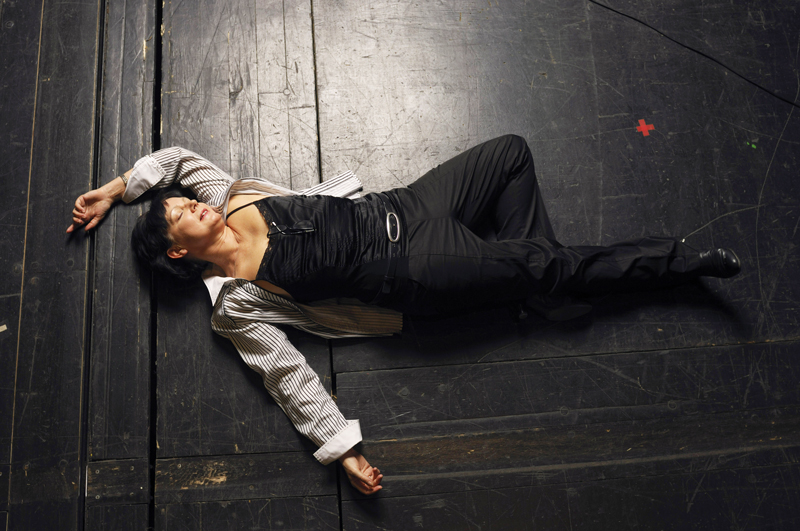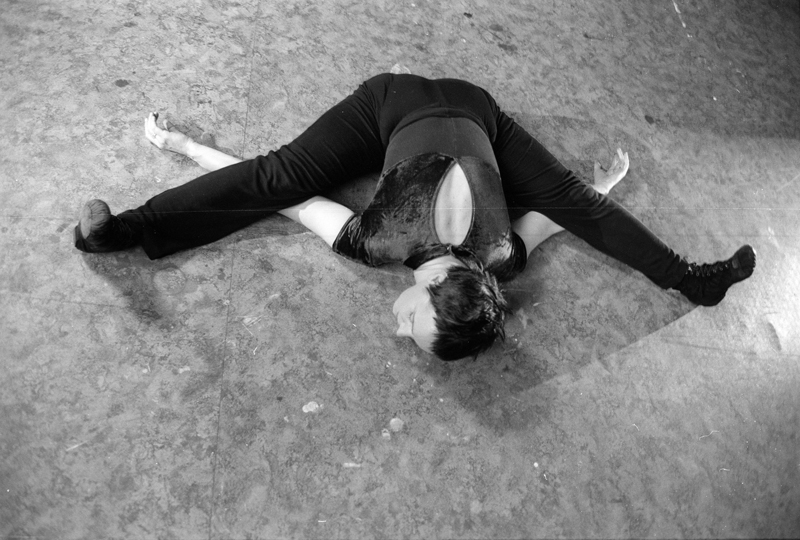In 1968, she graduated from ballet school in Poznan, and in 1982 from the Department of Dance Pedagogy at the Academy of Music in Warsaw. She has been a pupil of Nina Bielikowa, Aleksander Sobol, Peter Gosaa, Yuriko and Robert Cohen. From 1969 to 1988 she was the soloist for the Teatr Wielki (Grand Theatre) in Łódź. She also studied abroad, at L'Academie Internationale in Paris and at the Nederlanden Dans Theater in Holland. In 1988, she assumed the position of managing and artistic director, taking the place of Conrad Drzewiecki, at the Polish Dance Theatre - Poznan Ballet. She strives to broaden Drzewiecki's concept of the Polish modern dance school by including classical ballet as well. She is a professor at the Department of Education and the director of the Unit of Dance at the Fryderyk Chopin University of Music in Warsaw. She is also a member of the International Dance Council (CID) – UNESCO, ministerial expert and the president of the Polish Choreotherapy Association.
In 2005 Wycichowska estblished Dancing Poland including International Modern Dance Workshops, Modern Dance Biennale and International Dance Theatres Festival.
 Ewa Wycichowska, Łódź, 2011. Photo: Krzysztof Jarczewski / Forum
Ewa Wycichowska, Łódź, 2011. Photo: Krzysztof Jarczewski / ForumShe is one of the most multifaceted dancers in Poland. Included in her repertoire are both roles from classical ballet such as Juliet in Sergei Prokofiev's Romeo and Juliet (1969), Liza in Ferdinand Herold's La fille mal gardée (Polish trans., Córka źle strzeżona) (1973), and the title roles in Aram Khachaturian's Gajane (1975) and Adolphe Adam's Giselle (1979), as well as unusual and modern dance roles: Medea in Juliusz Łuciuk's musical performance (1982), roles in Mieczyslaw Karłowicz's Interpretacjach / Interpretations (1983) and Krzysztof Penderecki's Capriccio na choreografa / Capriccio for a choreographer (1988).
Ewa Wycichowskia is known for her courage as an artist, and for her constant search for new forms and means of expression. "Ewa Wycichowska has provided an unusually beautiful interpretation of the character Gajane, her masterful, romantic adagios are particularly clear in their lines, clean in their execution, and her acting subtle and convincing." (Zygmunt Gzella, "Gajane", "Odglosy", no. 49/1975)
The artist is also known from her choreographies created for theatres, operas, and films. She has worked with famous directors such as: Jerzym Jarocki, Krystyna Janda, Maciej Prus, Krzysztof Zanussi, Krzysztof Kieślowski, Jerzy Kawalerowicz, Adam Hanuszkiewicz, and Krzysztof Zaleski.
 Ewa Wycichowska during one of her rehersals, 2000. Photo: Andrzej Świetlik / Forum
Ewa Wycichowska during one of her rehersals, 2000. Photo: Andrzej Świetlik / ForumIn the performance Faust Goes Rock (1986), Wycichowska "surprised the audience above all with her courage in the bold personification of the secrets and all manner of intricacies of the human soul, she impressed with her unusual precision and simplicity in the way that she conveyed all of the complicated philosophy of Goethe's play into the language of dance." (Anna Izykowska-Mironowicz, "Teatr diablem podszyty", "Glos robotniczy", 19 Dec 1986)
For the benefit performance on the occasion of her twenty-fifth anniversary on the stage, she chose Carmen, danced to the music of George Bizet, Rodion Shchedrin and Heitor Villa-Lobos. "Once again, she has amazed us with her masterful technique, the lightness of her gestures and the wonderfully harmonic movement of her entire body." (Teresa Brodniewicz, "Gazeta Wielkopolska", 4 Dec 1993)
She made her choreographic debut in 1980 with the work Głos kobiecy / A Woman's Voice, with music composed by Krzysztof Knittel. From that time, she has done a great deal of choreography for various performances, the most interesting includes Mieczyslaw Karłowicz's Serenada (1982), Faust Goes Rock The Shade (1989), Igor Stravinsky's Rite of Spring (1989 and 1993), Mateusz Kuźnik's Samotnść Fauna / Loneliness of a Faun (1989), Maciej Malecki's Skrzypek opętany / The Mad Fiddler (1991), Misterium słońca / Mystery of the Sun on the basis of Alberto Ginastera's "Estancia" suite and "Ollantay" symphonic poem as well as Misterium ziemi / Mystery of the Earth based on the choreographic legend "Panambi" also by Alberto Ginastera (1993), Krzesimir Dębski's Album z tego świata / Album of this World (1992), Transsss... (1997) and Tango z Lady M. / Tango with Lady M. (2000).
"I am not a fan of theatres that focus exclusively on the director's own works, because sooner or later the dancers would be tired of the monotony. Theatre develops by drawing its vitality from the experiences of a variety of choreographers," Wycichowska has said. ("Rzeczpospolita", 19 April 1992)
She thus invites many different leading artists to work with the Polish Dance Theatre, including Brigit Cullberg, Örjan Andersson, Stanisław Wiśniewski, Toru Shimazaki, Matsa Eka. Wycichowska tries to create a ballet that speaks to modern audiences, through a very communicative language of movement linking elements of both classical and modern dance. In all the performances, music, choreography, drama and images merge together to create unique shows. Her own production Transss... (1997) is an "exciting adventure with Gombrowicz, at once a theoretical tract on the subject of ballet and a performance of a woman director and choreographer, as well as a story about people's dependence on one another." (Ewa Obrebowska-Piasecka, "Zegar teatru"). In one of her most recent choreographic works, Tango z Lady M. (2000), "the artist has penetrated all the various climates of Latin American dance: nostalgia, aggression, eroticism, combining different eras, stories and times." (Lara, "Tango bez konca", "Gazeta na Pomorzu", 1 Dec 2000)
In Cases of Mr Von K. inspired by Letters of Heinrich von Kleist, she focuses on artistic and tragic life of said German artist. The show was made in cooperation of Polish Dance Theatre and Kleist Forum from Frankfurt Oder. Carpe diem from 2007 was an outcome of inspirations of its creators' minds. The authors about the spectacle:
We gave a moment, time between the past and the future, to the children and poets. We no longer can feel pure rapture over things we are still experiencing. We can no longer feel things with all our souls and bodies, to absorb colors, tastes, sounds, movements. We canceled the present, harking back only to what used to be and planning the future. Our play was born out of the yearning for what it all used to be like. We wish to freeze the elusiveness of a meeting of creators and spectators, to get to know our carpe diem and to share it in such a way so as not to lose any moment. This is what was behind the work – mutual inspirations enticed by thoughts, music, movement, voices and sounds, colors and shapes.
In Spring-Effatha (2007) she combined minimalist choreography with multimedia in a ballet on ice. It is a breath-taking image of the „spring awakening”to Jacek Wierzchowski's music. Wycichowska stated:
We have shut off our senses, lost our child-like curiosity, openness and strength from nature, which cyclically comes to life.
Then in 2009 in Komeda – Sextet (on the 40th anniversary of his death) to film music by Komeda, she was exploring the meaning of „unforgettable 60s” today. In 2011 she directed Meetings in Two Unfulfilled Acts which was produced as a cooperation of the Grand Theatre in Lodz with Polish Dance Theatre – Poznan Ballet. Several generations of Polish dancers met to create a performance together. Krzysztof Knittel, one of the artists, said:
Years ago, the debut has occured, Ewa Wycichowska as a choreographer and mine as a composer of ballet music – for the dancers of the Grand Theatre in Łódź. The premiere took place on December the 6th 1980. Our actions was inspired by the erotic cycle :Female Voice" by Rafal Wojaczek. Music, written for the percussion instruments and electronic sounds strongly alluded to the rythms of Middle Africa. Now we are coming back to this stage in "two unfulfilled meetings"... After years of our "Meetings" the same dancers shows up, the same who took place in the same performance. [...] Composers and choreographers, who we know and admire for their creations, and next to our work you will see their pieces together with their imagination, different sens of form, new themes and problems. Meetings of different generations, different creative attitudes, different artistic ideas and visions.
A year later Wycichowska made FootBall@... to talk about the atmosphere and emotions during Euro 2012.
Wish you were here (2013) and Good to have you here (2014) were based on Polish Dance Theatre's original choreographic materials from 1973-1993 and were dedicated to dancers connected to the theatre. These are to present the audience the world of dance „that becomes the guide to the past times and sometimes penetrates present plots”. In November 2015 Wycichowska choreographed and directed Lament. In Memory of Tadeusz Rożewicz. It was inspired by renowned collection of poems by Różewicz called Mother Departs.
The authors want to infiltrate the transgressive world formed between the space of the trauma and the space of the artistic piece. The piece has a therapeutic and expiative nature. The essence of the intimate confession contained in literary works included in Różewicz’s volume has inspired the show’s authors to work with selected plots and motives. In a creative manner the authors adapt the literary piece to the genre structure of a dance theatre. By balancing the importance of words and movements, by building a dramaturgical structure using a semantic sign and a body sign, the authors of the show think about the dichotomy of the world and the dichotomy of art. (European Capital of Culture 2016)
For Wycichowska, dance is a symbiosis of music, visual art and movement.
"Through choreography, I tell about myself, including in it my attitude towards the world, life, asking questions to which I am searching for the answers, attempting to define a set of values and goals. (...) Perhaps this sounds paradoxical, but I try to avoid simply creating fictional stories, I am not interested in things that are able to be expressed in terms of concepts that are semantically closed; what I am doing is my choreographic path toward illumination that is more often subject to the spirit rather than the material world." ("Głos Wybrzeża", 13 Nov 1997)
Awards:
- 1970 - First prize in the performance category at the Polish Choregraphy Competition in Łódź
- 1985 - Stanisław Wyspiański Award, First Degree
- 1991 - Vaclav Nizynski Medal for her choreography to Rite of Spring and Samotnosc Fauna / Loneliness of a Faun
- 1991 - Hetman's Sceptre Award at the Zamość Summer Theatre Festival for Faust Goes Rock
- 1992 - Special Awards Fringe First at the Edinburgh Arts Festival for the show Samotność Fauna / Loneliness of a Faun
- 1994 - special Golden Mask Award from the Lodz theatre critics for her twenty-fifth anniversary on the stage
- 2000 - Hetman's Sceptre Award at the Zamosc Summer Theatre Festival for Tango z Lady M.
- 2000 - Leon's Chair, statue for the most interesting show at the Contemporary Drama Review in Zielona Góra
- 2002 - Hetman's Sceptre Award at the Zamość Summer Theatre Festival for B@ttle between Carnival and Lent
- 2007 - Gloria Artis Silver Medal - Zasłużony Kulturze; The Award of the Czech Republic TV for B@ttle between Carnival and Lent during the Golden Prague International Television Festival in Prague
- 2008 – Polish Branch of the International Theatre Institution Award – for popularising Polish theatre abroad; Special Award of the Minister of Culture and National Heritage for contributions to Polish culture. .
- 2015 - Verba Docent Exempla Trahunt Golden Medal from the Hipolit Cegielski Association; Award in Dance category of the Ministry of Culture and National Heritage
Sources: Polish Dance Theatre, updated April 2016